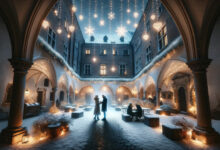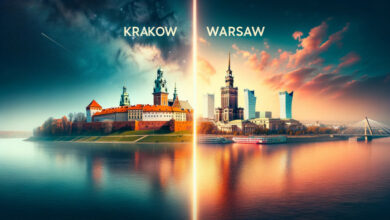Christmas in Poland
A Traditional Polish Christmas: Discover the Unique Holiday Customs and Traditions
Christmas in Poland is a major annual celebration that combines old Polish pagan customs with religious traditions introduced after the Christianisation of Poland by the Catholic Church. As in most countries of the Christian world, it is a time for families to come together, share delicious meals, and uphold beloved customs.
In Poland, the festive season officially begins with Advent, starting on December 1st, which is a time for both practical and spiritual preparations before Christmas. The most important event in the Polish Christmas celebrations is Wigilia, the Christmas Eve vigil supper. Observed on December 24th, Wigilia is a widespread tradition that is cherished by many households – be they believers or non-believers – across the country.

As you delve more into the Polish way of celebrating Christmas, you will discover the unique customs and practices that have survived through generations and continue to form an integral part of this joyous holiday. From scrumptious traditional meals to popular Christmas carols, Polish Christmas festivities are full of warmth, community, and cherished traditions that remind us of the true spirit of the season.
Christmas in Poland
When you think of Christmas in Poland, the first thing that comes to mind is the rich tradition and festive atmosphere that surrounds this special holiday. In Poland, the Christmas season is not only about exchanging gifts and enjoying time with family; it’s about embracing the cultural heritage and participating in age-old customs that make the occasion truly unique.
One of the most important aspects of Christmas in Poland is Wigilia, the traditional Christmas Eve supper. On this day, families gather around a table covered with a white tablecloth, preparing and sharing a meal together.

The feast usually consists of 12 dishes, symbolising the 12 apostles, and presents a mix of lean dishes such as fish, beet soup, and various types of pierogi. It is customary to set an extra plate for an unexpected guest, a representation of welcoming strangers and sharing the warmth of the festive season.
Another element of Polish Christmas culture is the Advent period leading up to December 25th. During this time, many households bake piernik, a type of gingerbread, in various shapes such as hearts, St Nicholas figures, and animals. The Christmas tree, or choinka, is another essential part of the celebrations, traditionally decorated and lit on Christmas Eve. In some regions of the country, people also create colourful and intricate paper decorations called ‘paper stars’ to adorn their homes and trees.

On December 6th, Poland celebrates Mikołajki, also known as St. Nicholas Day. This day marks the beginning of the Christmas festivities and involves Santa Claus, or Mikołaj, visiting children and adults alike, bringing gifts and spreading joy. It is a day filled with excitement and anticipation, setting the tone for the rest of the season.
In Poland, the Christmas celebration does not end on December 25th. It lasts until the Feast of the Three Kings on January 6th, also known as Epiphany. This day commemorates the visit of the three wise men to baby Jesus and the revelation of his divinity to the world. It is a public holiday in Poland, filled with colourful parades and events, bringing the Christmas season to a close.
Polish Christmas Traditions
Advent Period
During the Advent period, you’ll find Polish families preparing for the upcoming celebrations. One important tradition during this time is the baking of Christmas piernik (gingerbread) and making Christmas decorations.
Typically, Roman Catholics mark the beginning of Advent four Sundays before Christmas day, serving as a time of anticipation and preparation for the birth of Christ.
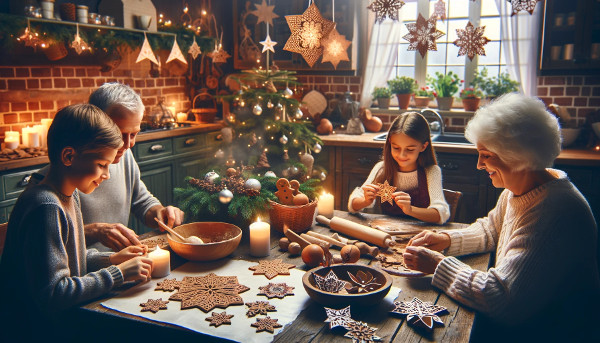
Christmas Eve Festivities
In Poland, Christmas Eve, or Wigilia, is the most significant day during the Christmas period. On this day, families gather around their dining tables, waiting for the appearance of the first star in the sky, symbolising the Star of Bethlehem. Before the feast begins, the breaking and sharing of opłatek wafer takes place among family members, followed by a prayer.
One unique aspect of Wigilia is the observance of fasting throughout the day, and partaking in a meat-free Vigil Supper with an odd number of dishes, usually 12, representing the 12 apostles. It is common to prepare an extra plate for an unexpected guest, reflecting the importance of hospitality in Polish Christmas traditions.
Christmas Day Celebrations
Christmas Day, celebrated as the birth of Christ, is a time when families attend church services, with Midnight Mass being a popular choice. After church, they usually return home to continue their family celebrations, including gift-giving.
Gifts are traditionally believed to be brought by Baby Jesus, though in recent times, Święty Mikołaj (St. Nicholas) has become increasingly popular.
Boxing Day Observances
In Poland, the day after Christmas Day, also known as Boxing Day, is a public holiday. This day allows families to extend their celebrations and enjoy their time together. It’s common to continue visiting family members, friends and even share gifts during this time.
Epiphany Celebrations
Epiphany, observed on the 6th of January, marks the end of the Christmas period in Poland. This day commemorates the visit of the Magi to the baby Jesus and is often celebrated with nativity plays, parades and blessings at churches.
Some towns even organise outdoor performances, showcasing the biblical story of the Magi’s journey to Bethlehem.
Other Customs
Apart from the main events, various customs enrich Polish Christmas traditions. The Christmas tree is a staple of the season, usually decorated with apples, sweets, nuts wrapped in colourful wrappers, cookies, and straw stars.
Children may take part in performing nativity plays, known as “Jasełka,” dressed as various characters from the Nativity story.

The Nativity
The Nativity, or the birth of Jesus, lies at the heart of Polish Christmas traditions. Celebrations and customs revolve around this significant event, and it is deeply ingrained in the nation’s religious and cultural heritage.
From Advent to Epiphany, people across Poland embrace the joy and warmth of these treasured customs in honour of the Nativity of Jesus and the importance of family.
Traditional Dishes of Christmas in Poland
During Christmas in Poland, there is an abundance of unique and delicious traditional dishes that are enjoyed throughout the festive season.
In this section, we will explore the culinary delights that make up the Christmas Eve supper, the Christmas Day menu, and the remarkable array of Polish Christmas baking.
Christmas Eve Supper
On Christmas Eve, the most important meal in Poland is the supper, known as “Wigilia.” This meal traditionally consists of 12 dishes, symbolising the 12 apostles.
The Christmas Eve supper is primarily vegetarian, with a focus on fish, fruits, vegetables, and nuts:
- Fish: Carp is the most common fish served, alongside herring in various forms, such as śledź pod pierzynką (layered herring salad).
- Soup: The meal usually starts with a hot bowl of borscht (beetroot soup), known as barszcz czerwony, often accompanied by uszka (small dumplings) filled with cabbage and mushrooms.
- Pierogi: These delicious Polish dumplings are a staple at any festive meal and are typically filled with mushrooms and sauerkraut, farmer’s cheese, or potatoes.
- Cabbage: Various cabbage dishes are served, such as bigos (sauerkraut with mushrooms), and kapusta (stewed sauerkraut).
- Kutia: This is a sweet dish made from wheat, poppy seeds, honey, and dried fruit; symbolising abundance and prosperity.
Christmas Day Menu
Christmas Day feasting continues the culinary journey, including some of the following dishes:
- Roast meats: Turkey, pork, and beef are popular choices, often served with a rich sauce or glaze.
- Side dishes: Boiled, roasted, or mashed vegetables, such as beetroot salad, potatoes, and pickled cucumbers.
- Cold cuts: Sausages, ham, and other cured meats are likely to make an appearance.
Polish Christmas Baking
No Polish Christmas would be complete without an array of delightful baked goods:
- Pierniki: A type of gingerbread originating from the city of Torun in the 14th century. This spiced cake is a cornerstone of the 12 Christmas dishes.
- Poppy seed cake: Known as makowiec, this roll cake is filled with a sweet poppy seed paste, raisins, and nuts.
- Kolaczki: Delicate, buttery pastries typically filled with fruit preserves or sweet cheese.
In summary, the Christmas season in Poland is a time to embrace the rich culinary traditions that have been passed down through generations. From the symbolic 12 dishes of the Christmas Eve supper to the hearty fare on Christmas Day and the irresistible baked goods, the Polish Christmas table is a delicious celebration of family, faith, and, of course, incredible flavours.
Polish Christmas Symbols
Christmas Tree
In Poland, Christmas is not complete without a Christmas tree. Traditionally, the tree is decorated and lit on Christmas Eve, known as Wigilia. You’ll find ornaments, cookies, straw stars, and a large number of apples, nuts, and sweets adorning Polish Christmas trees. Both fir and pine trees are popular choices.
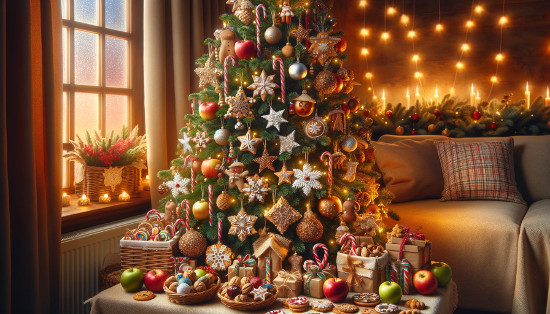
Star of Bethlehem
The Star of Bethlehem, or Gwiazdka, is an important symbol in Polish Christmas. It represents the star that led the three wise men to baby Jesus in Bethlehem. The star can be found in many decorations, including tree toppers and nativity scenes.
Grandfather Frost
Grandfather Frost, or Dziadek Mróz, is the Slavic winter character similar to Santa Claus or Saint Nicholas. Although not as commonly celebrated as Saint Nicholas, Grandfather Frost may still be a part of Polish Christmas celebrations in some regions.
Saint Nicholas and Santa Claus
In Poland, Saint Nicholas, or Święty Mikołaj, plays a significant role in the Christmas celebrations. December 6th marks Saint Nicholas Day, when children receive gifts from this revered figure. Santa Claus, or Święty Mikołaj in more contemporary interpretations, is also present during the Christmas season, bringing gifts to children on Christmas Eve.
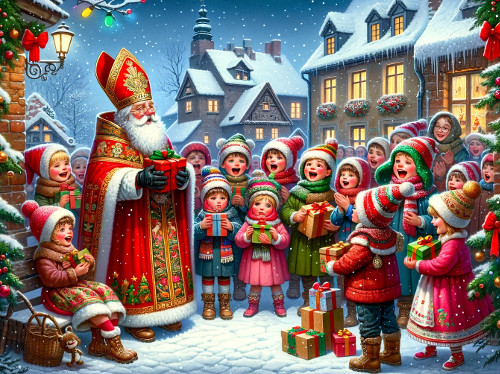
Nativity Scenes
A key element of Polish Christmas is the Nativity scene, which illustrates the birth of Jesus. Families often display a Nativity scene, or szopka, in their homes, and towns may have life-sized Nativity scenes or even host nativity plays to re-enact the events in Bethlehem.

Christmas Carols
Caroling is a popular tradition during the Christmas season in Poland. People gather to sing Christmas carols, or kolędy, sometimes even going house to house to perform.
Pastorałki are a type of Polish Christmas carol that focuses on pastoral themes, celebrating the shepherds who visited baby Jesus. A well-known Polish Christmas carol is “Bóg się Rodzi” (“God is Born”), a song that captures the essence of the season.
Christmas Markets
Historic Christmas Markets are common in Poland during the festive season. At these markets, you can shop for unique gifts, decorations, and delicious treats.
They provide an opportunity to immerse yourself in the Christmas atmosphere and experience the vibrant Polish culture and traditions.
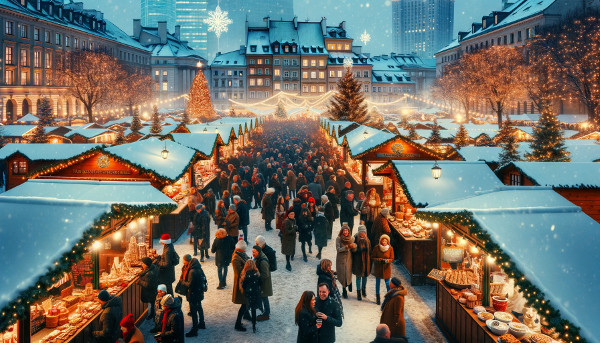
Polish Christmas for Children and Family
Gift-Giving Traditions
In Poland, Christmas is a special time for children and families. One notable gift-giving tradition is Mikołajki, celebrated on December 6th. On this day, Santa brings presents to children, who often find them under their pillows in the morning.
The custom is particularly popular in schools, where kids draw each other’s names a few weeks before Mikołajki and then exchange small gifts on the day itself.
Family Gatherings
Christmas Eve, or Wigilia, holds immense importance for Polish families. They typically gather together for a festive Christmas Eve Dinner known as kolacja wigilijna.
This meal consists of various traditional dishes such as borscht with mushroom dumplings, fish, and pierogi. Before the meal begins, families share a special wafer called opłatek while wishing one another happiness, love, and success in the coming year.
It is believed that no physical work should be done during the three days of Christmas celebrations, allowing families to focus on spending quality time together.
Christmas Plays and Songs
Polish children relish in the joy of Christmas through customary plays and songs, such as Jasełka—nativity plays staged by kids at schools and churches. These performances are a delightful highlight of the Christmas season and depict the birth of Jesus with a unique blend of biblical storylines and traditional Polish elements.
Additionally, singing Christmas carols, or kolędy, is a popular activity during this festive period. Families often sing these carols together after the Christmas Eve Dinner or during get-togethers with relatives and friends. Some favourite traditional Polish carols include “Lulajże, Jezuniu,” “Wsrod nocnej ciszy,” and “Gdy sliczna Panna.”
Read also:
Start Planning Your Krakow Trip Now!
- Unsure where to stay in Krakow? Discover top-rated Old Town and Kazimierz hotels with Booking.com.
- Book your airport transfer now and enjoy a hassle-free ride directly to your hotel. Driver will meet you at John Paul II International Airport Kraków–Balice.
- Take a Tour of Auschwitz. Arrange a visit to the Auschwitz-Birkenau Memorial and Museum to pay tribute and learn about this significant historical site.
⚠️ SUMMER BOOKING ALERT: Auschwitz tours are in high demand during the busy summer season. Secure your visit now to guarantee your preferred date and time slot. Last-minute availability cannot be guaranteed during this peak season. Due to increased visitor numbers in summer, it’s strongly recommended to book your tickets and tour to Auschwitz well in advance to secure your preferred dates and times! 🔖
- Explore the Fascinating Wieliczka Salt Mine! Book your guided tour today. These tours are very popular, so book early to avoid disappointment and ensure your spot.
- Looking for ideas? Check out our KrakowTOP.org recommended itineraries, including the famous Christmas Market, holiday events, and must-see Krakow attractions like Wawel Castle, Oskar Schindler’s Factory and St. Mary’s Basilica.
- Auschwitz Tour from Warsaw
- Creepy Facts about Poland
- Driving in Poland
- Facts About Auschwitz
- Frequently Asked Questions about Krakow
- How to Visit Auschwitz
- Krakow: Christmas Market and Delicacy Sampling Tour
- Krakow River Cruise
- Krakow Tour Packages
- Krakow Weather in November
- Krakow Weather December
- Poland’s currency
- Royal Route Krakow
- The Most Haunted Places in Poland
- Visiting Krakow in Winter
- What Do I Need to Know Before Going to Auschwitz?
Christmas Greetings and Wishes
During the festive season in Poland, you will commonly hear people exchanging warm Christmas greetings. The most popular phrase to say Merry Christmas in Polish is Wesołych Świąt. This phrase can be used on its own or in combination with other expressions to convey a heartfelt message.
One of the ways to wish someone Merry Christmas is to say Wesołych Świąt Bożego Narodzenia, which translates to “Merry Christmas of the Nativity”, highlighting the religious significance of the celebration. However, the shorter version, Wesołych Świąt, is often preferred and considered appropriate for all occasions, whether it’s at work, in social gatherings, or within the family.
As you greet people during Christmas, you may also want to wish them good health and happiness. For this, you can say Dużo zdrowia, which means “lots of health”. Health, happiness, and prosperity are common themes when it comes to sharing festive wishes in Poland.
Here are some more wishes you can use during the Christmas season:
- Wesołych Świąt, pełnych miłości i radości! — Merry Christmas, filled with love and joy!
- Niech gwiazdka betlejemska napełni Twoje serce spokojem i nadzieją. — May the Bethlehem star fill your heart with peace and hope.
In summary, it’s lovely to share warm Christmas greetings and wishes in Poland like Wesołych Świąt, Wesołych Świąt Bożego Narodzenia, and Dużo zdrowia. These expressions carry the spirit of the festive season and help create a joyful and heartfelt atmosphere among friends, family, and colleagues.
As we celebrate the birth of Jesus Christ, may His peace, love, and serenity descend upon you and remain with you forever. May this holy season bring abundant happiness and joy to you and your loved ones. Merry Christmas and God’s blessings in the New Year!
May the festive spirit of Christmas fill your home with joy, your heart with love, and your life with laughter. Wishing you a season of blessings from heaven above. Happy Holidays!
Warm wishes,
The KrakowTOP.org Authors Team




